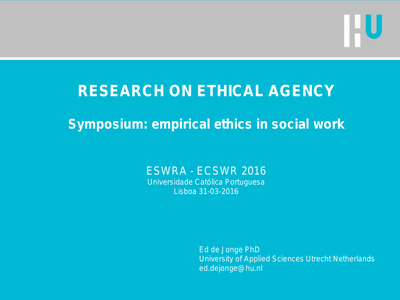Vergelijkende Europese studie in opdracht van Kees van Aken, toenmalig directeur van de opleiding Social Work i.o. van de Hogeschool Zuyd, naar welke verschillende varianten er mogelijk zijn als er gesproken wordt over een Internationale Bachelor Social Work - Maastricht. Op welke manieren zijn er in Europa reeds internationale bachelors zijn ontwikkeld. Het onderzoek moet een overzicht van enkele blauwdrukken van een Internationale Bachelor Social Work opleveren, om mede op basis daarvan een keuze te maken voor een (eventueel meerdere) voor Hogeschool Zuyd wenselijke variant(en) daarvan in Maastricht. Er is vergelijkend Europees onderzoek gedaan naar de verschillende filosofieën en organisatievormen van curricula International Social Work zoals die op verschillende Hogescholen en Universiteiten in Europa functioneren. Met name zijn “good practice” ervaringen onderzocht en met elkaar vergeleken, om op basis daarvan een aantal varianten helder te krijgen voor de opdrachtgever.
DOCUMENT

Social work is a profession that is very much part of and contributes to an ever changing and evolving society. It is therefore essential that social work is able to respond to the diverse and dynamic demands that it may encounter in that society and in the future. The critique of social work is, however, present and growing. The profession can no longer deny or ignore the need to legitimize its value and effectiveness. In this article, a research project – entitled Procivi – aimed at developing a method of legitimizing social work is presented. The method developed in Procivi proposes a way of legitimizing social work through the development of reflective professionals. The method teaches professionals to take a research frame of mind towards their own practice and helps them develop a vocabulary to describe their work to different audiences. The paper discusses whether and how this method forms a viable way of legitimizing social work and as such could be an alternative for the growing demand for social work based on scientific evidence (evidencebased practice, EBP).
MULTIFILE

This research aims to contribute to a better understanding of strategic collaborations between work-integration social enterprises (WISEs) and for-profit enterprises (FPEs) with the joint objective to improve labour market opportunities for vulnerable groups. We find that most collaborations strive towards integration or transformation in order to make more social impact.
LINK
Because social workers respond to local contexts, it is often said that social work is not a global profession. Indeed, social workers adapt their practices to local conditions. However, these local practices are recognised globally. The exchange of these practices and methods enriches social workers, inspires them and strengthens the further development of the profession. To facilitate this exchange, social work has had several international associations and networks for almost a century, which have enabled the sharing of local practices and educational programs. Today, social work works within a basic international framework that guides both professional practice and education. This descriptive article will take the reader through the history of international social work, by mentioning some global social work associations and networks and their achievements. Furthermore, the article will address internationalisation of the social work curriculum and will mention the added values and disadvantages of an international experience abroad. (Includes an abstract in the Slovakian language)
MULTIFILE
Presentation at the 6th International Conference on Sociology and Social Work – Zwolle, The Netherlands, 24 and 25th August 2016
DOCUMENT
Although the contribution of social entrepreneurship to social innovation is becoming increasingly acknowledged in theory and practice, it is less apparent in relation to social work. This chapter aims to contribute to a better understanding of social entrepreneurship in relation to issues of social innovation and social work. We will do this by focusing in particular on work integration of vulnerable groups, one of the most dominant impact areas in which many social enterprises are active and which most directly relates to the traditional domain of social work. The chapter analyses specific examples from the UK and the Netherlands to discuss how social enterprises have contributed to systemic change in the social domain, and what its possible implications could be for the future of social work.
LINK
Poster presentation at the European Social Work Research Conference - ESWRA, Aalborg, Denemarken, 20 april – 21 April In the last decade a call is made upon a stronger knowledge base for social work and an abiding professionalism of practice. Transformations in The Netherlands state welfare regime are amongst others a big impetus for this demand. Universities of Applied Sciences (UAS) contribute substantially in answering this legitimation call. UAS in The Netherlands adopted a research function since 2000 and practice oriented research is prevailing in their type of reseach. Both fields, social work practice and social work research as conducted by UAS, are relatively new and are to a certain degree reinventing themselves. It makes practice oriented social work research a timely topic. This poster presents the outline and aim of the PhD research on how to optimise practice.
DOCUMENT

Symposium ESWRA - ECSWR 2016: empirical ethics in social work. Objective: ethical aspects of social work (esp. at home) Structure: cooperation of the research group of UAS Utrecht Netherlands with six regional welfare organizations Method: practice based ethics research Focus on professional practice: learning from moral experiences in frontline practice (cf. Van Doorn, 2008) Hybrid approach: combining theoretical resources and professional practice (cf. Banks & Gallagher, 2009) Mixed methods: desk research, interviews, best practice units (BPU), development of ethical tools
DOCUMENT
